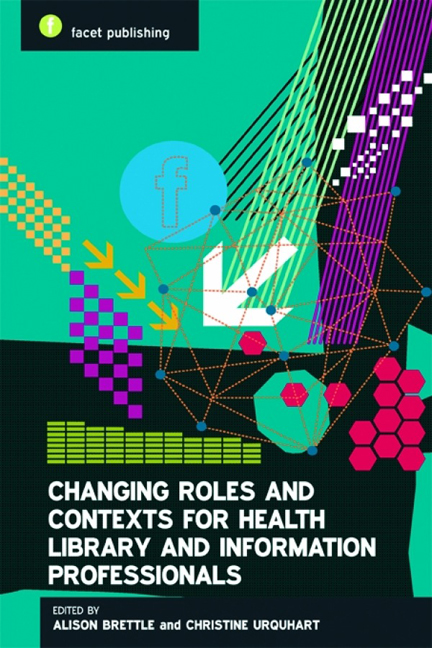Book contents
- Frontmatter
- Contents
- About the editors
- List of contributors
- Overview
- Part 1 Context
- Part 2 Roles
- 5 Skills, competencies and knowledge
- 6 The librarian as information provider and educator
- 7 The librarian who analyses information and manages knowledge
- 8 The librarian within research and evidence-based practice
- 9 The librarian as decision maker
- Conclusion
- Index
5 - Skills, competencies and knowledge
from Part 2 - Roles
Published online by Cambridge University Press: 08 June 2018
- Frontmatter
- Contents
- About the editors
- List of contributors
- Overview
- Part 1 Context
- Part 2 Roles
- 5 Skills, competencies and knowledge
- 6 The librarian as information provider and educator
- 7 The librarian who analyses information and manages knowledge
- 8 The librarian within research and evidence-based practice
- 9 The librarian as decision maker
- Conclusion
- Index
Summary
Introduction
This chapter sets the scene for this second part, which focuses on roles. Later chapters discuss some case study examples of the ways in which some health library and information professionals have developed their roles in all sorts of working environments. First of all, we need to remember what is meant by role, as discussed earlier in the overview. Sociologists can help us unpick some of the assumptions we make about roles in a working environment, and why roles can be seen as a problem or an opportunity. Second, we need to think about the distinguishing features of roles – what are the expectations of this role or that role? What should some professionals be expected to be able to do, and what skills do they need in order to be able to perform in their roles? Third, what does interprofessional working really mean, and how do we learn from reflection on our own practice, and from observing others? How do our information professional colleagues and other colleagues help us develop professionally?
The Chartered Institute of Personnel Development (CIPD) points out that there is a distinction between competencies and competences, although many people do not now distinguish between the terms. Strictly speaking, competency is precisely defined as ‘the behaviours that employees must have, or must acquire, to input into a situation in order to achieve high levels of performance’ (CIPD, 2010). The focus is on the person, and behaviour and performance. The CIPD (2010) define competence in terms of a system of minimum standards or a demonstration of performance and outputs, and the focus here is on the job. Occupational standards, which are concerned with expectations of particular job roles, deal with competences. This chapter will be focusing on competencies, and some of the competency frameworks that have been developed and used to analyse and assess health information and library workers and the work they do. Some frameworks mix competencies and competences, but sometimes the purpose of the framework helps to identify whether the focus is on the individual or the job. We need to think about expertise, the definitions of professional expertise and knowledge, and how that knowledge is acquired and developed to make a professional perform well in practice. Sometimes competencies may be identified and formal courses devised (e.g. Oliver et al. (2008) describe a special course for searching for informationists devised by an interprofessional team).
- Type
- Chapter
- Information
- Publisher: FacetPrint publication year: 2011



